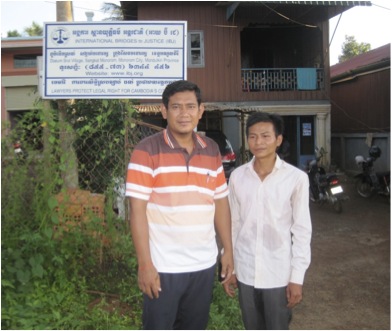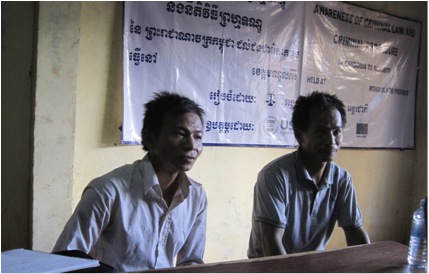

IBJ provincial lawyer Makara with his former client Sophal in front of Mondulkiri office
Two years ago, Sophal (not his real name) and six of his friends became statistics in the Cambodian government’s crackdown on drug use, which targets young, often poor, Cambodians. At that time, Sophal was 21 years old and in high school. Unfortunately, he had developed a habit of using drugs and the police were keeping an eye on him and his group of friends. One day, as Sophal and his friends were riding their motorbikes from a village in the forest back to Sen Monorom, Mondulkiri’s capital, an undercover policeman asked them if they had any drugs. Sophal did not answer, but some of his friends told the man that they had drugs and then tried to sell him some. The police arrested all of them.
Under Article 98 of the code of criminal procedure, the police are allowed to interrogate a suspect for 24 hours without his lawyer present, but after that period the accused may ask for a lawyer or representative. The average Cambodian who is accused of a crime, however, often does not know that he has such a right; and, even if he knows his rights, he may fear that he will have to pay more than he can afford if he requests a lawyer. Unfortunately, because the Cambodian government does not currently sponsor free legal aid in Cambodia, the accused is usually correct to believe that he will have to pay dearly for a lawyer. Especially the poorer Cambodian citizens cannot afford to pay the rates that private lawyers charge here. IBJ lawyers reach out to as many clients as they can, charging nothing, but there are currently only twelve lawyers on staff, covering seventeen provinces.
After 24 hours of interrogation, Sophal was neither informed of his right to have a lawyer present, nor that he could get one for free through IBJ. The police accused him of drug-trafficking. Fortunately, his father had heard of IBJ—an encouraging sign for the success of IBJ’s word-of-mouth campaigns—and contacted the IBJ lawyer in Mondulkiri named Makara. Makara also represented the other six accused. By emphasizing Sophal’s youth, lack of prior criminal history, and desire to continue his education, Makara persuaded the trial judge to sentence Sophal in consideration of mitigating circumstances, permitted by Article 93 of the penal code. Thus, instead of the typical five-year minimum sentence for drug trafficking, the trial judge sentenced Sophal to 20 months in prison. Makara also got the young men’s sentences reduced, and even persuaded the trial judge to acquit one of the men for lack of evidence.
Today, Sophal is 23 years old. He came to be interviewed in IBJ’s Mondulkiri office out of gratitude to Makara and IBJ. He remembers vividly how fearful he was of being kept in jail for many years, isolated from his friends and family. Without a good lawyer like Makara to represent him, Sophal would probably still be in prison today. Even the 20-month sentence proved very costly because it interrupted Sophal’s education, probably permanently; and, sadly, Sophal’s father died while Sophal was incarcerated. Luckily, his family is very supportive. While Sophal was in prison, his family often traveled the 6 kilometers there and paid the visiting fee to see him. Sophal no longer uses drugs and has drifted away from the friends he used to spend time with. Now, he lives with his uncle, a carpenter, and is trying to find steady employment so that he can go back to school and study information technology. Makara knows how difficult it can be for a young man with a criminal record to get a job, but he encourages Sophal to persevere. As he listens to Makara’s reassuring words, Sophal’s face tells the appreciation and profound respect he has for the man who saved more than three years of his life, free of charge.

Sophal and his uncle interviewed in IBJ’s Mondulkiri office